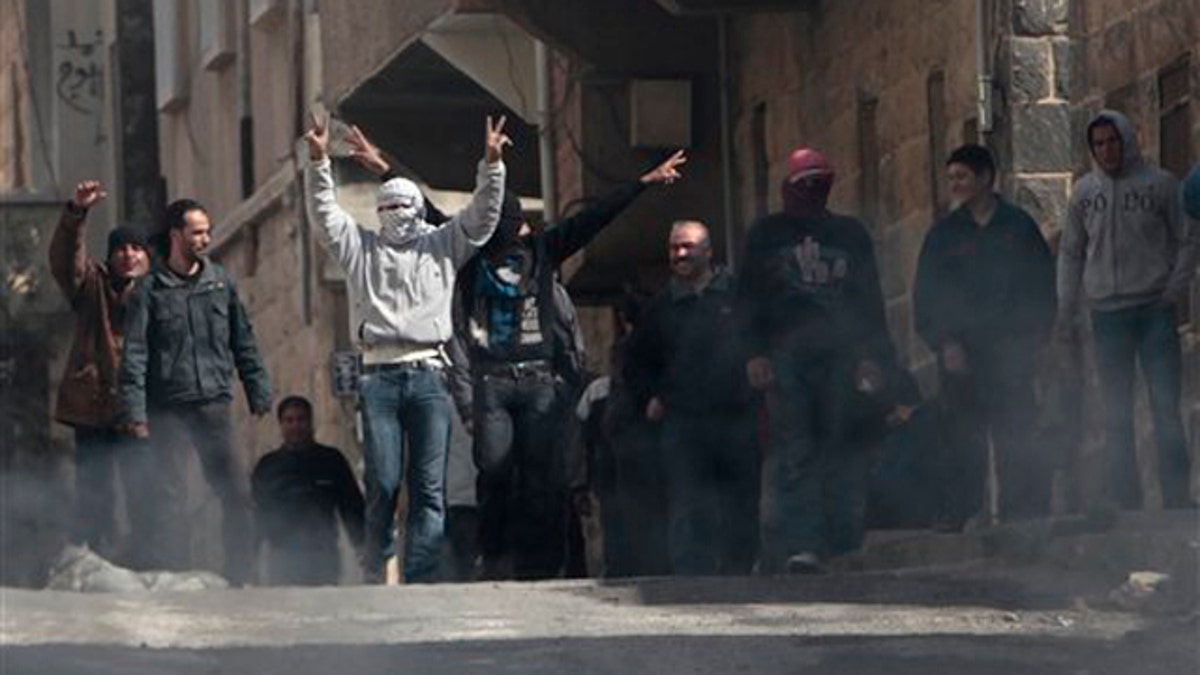
Anti-Syrian government protesters flash V sign as they protest in the southern city of Daraa, Syria, March 23. (AP)
As unrest spreads in the Middle East, so does the debate in Washington over how far the United States should go in seeking to shape the outcome.
President Obama's decision to order missile strikes in support of an internationally maintained no-fly zone in Libya has caused a host of political headaches for him on Capitol Hill, in the form of lawmakers demanding he come crawling to Congress for permission after the fact.
But the president's attention already is being diverted by intensified uprisings against leaders friend and foe -- deadly clashes in Syria, a possible changing of the guard in Yemen and continued tensions in Jordan and Bahrain. As with Libya, these conflicts have the administration being pulled in different directions.
Two U.S. senators, Jon Kyl, R-Ariz., and Mark Kirk, R-Ill., urged the administration Thursday to speak more forcefully on Syria and coordinate with the opposition after protesters were killed.
"We can ill afford another timid embrace of a democratic uprising," they said.
The administration's response is fluid.
Though the White House says it's not in the business of picking leaders, Defense Secretary Roberts Gates seemed to step beyond White House talking points while in Israel, suggesting the Syrian military walk like the Egyptians and let the protesters rise up.
"I've just come from Egypt, where the Egyptian army stood on the sidelines and allowed people to demonstrate and in fact empowered a revolution. The Syrians might take a lesson from that," Gates said, according to an account in Reuters.
White House Press Secretary Jay Carney said Friday the administration condemns the Syrian government's repressive tactics and is talking with allies, but he did not go so far as Gates.
The administration's comments on Syria follow a set of comments on Libya in which different officials gave different impressions about the direction of the mission. The administration is likely to face additional pressure to better define its stance on Yemen, where President Ali Abdullah Saleh -- unlike Syrian President Bashar al-Assad, a key U.S. ally in efforts to battle Al Qaeda -- has agreed, conditionally, to step down.
Former Pentagon spokesman J.D. Gordon said the unrest in Syria has not yet reached a point that demands U.S. involvement, but he suggested Yemen could be more volatile and dangerous for U.S. interests amid a regime change.
"I think we need to get involved," he told Fox News. "It could make Afghanistan look easy. ... The last thing we need is an Al Qaeda-sponsored government in Yemen."
Asked about Yemen Thursday, Carney stressed that "political dialogue" is the ideal route to resolving these conflicts.
"We're not in the business of choosing for the peoples of these countries who their leaders ought to be. ... Whatever the leadership in the future looks like for Yemen, that's got to be decided by the people of Yemen and not by the people of the United States," he said. "We do not build our policy, in any country, around a single person. And we obviously will look forward to having a solid relationship to the leader of Yemen."
With Libya, discontent on Capitol Hill is building ahead of Congress' return to Washington next week.
Rep. Dennis Kucinich, D-Ohio, and other lawmakers want to defund the operation. Others are demanding a vote, or at least more communication between the White House and Congress. In an attempt to assuage these concerns, Obama held a conference call on Libya with congressional leaders Friday afternoon. And Carney said the president would speak publicly about the conflict in the "very near future."
While some express concern Libya's Muammar al-Qaddafi could remain in power when the dust settles, a number of lawmakers have stressed over all else that the administration must not send ground forces into the nation -- something Obama vows the U.S. won't do. Lawmakers expressed cautious optimism Friday about NATO taking partial control of the mission.
"Now that our military has prevented an immediate disaster, I have very serious concerns about what this intervention means for our country in the coming weeks," Sen. Jay Rockefeller, D-W.Va., said in a statement. "I feel very strongly that we need to avoid deep military involvement in a third foreign country -- particularly in a country whose politics and society are largely unknown to us."
Rep. Justin Amash, R-Mich., announced Friday he would introduce a bill ordering a stop to Libyan operations until Obama seeks congressional approval.
"Whether or not Congress agrees with the president's decision, initiating this conflict was not his decision to make alone," Amash said.












































